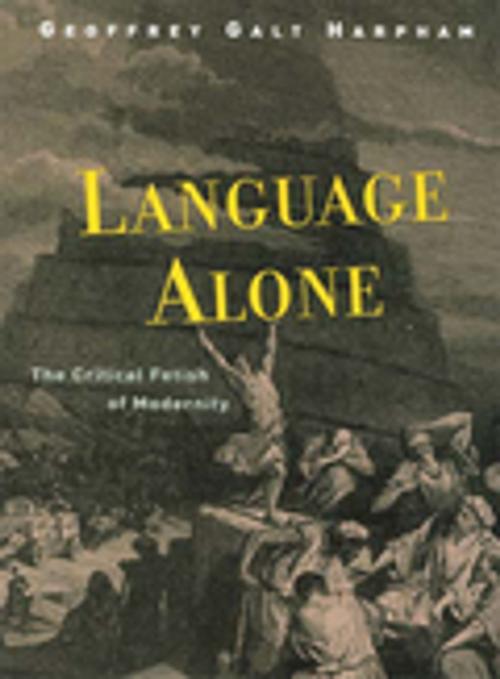Language Alone
The Critical Fetish of Modernity
Fiction & Literature, Literary Theory & Criticism, Children&| Author: | Geoffrey Galt Harpham | ISBN: | 9781134734320 |
| Publisher: | Taylor and Francis | Publication: | August 27, 2013 |
| Imprint: | Routledge | Language: | English |
| Author: | Geoffrey Galt Harpham |
| ISBN: | 9781134734320 |
| Publisher: | Taylor and Francis |
| Publication: | August 27, 2013 |
| Imprint: | Routledge |
| Language: | English |
How did the concept of language come to dominate modern intellectual history? In Language Alone, Geoffrey Galt Harpham provides at once the most comprehensive survey and most telling critique of the pervasive role of language in modern thought. He shows how thinkers in such diverse fields as philosophy, psychoanalysis, anthropology, and literary theory have made progress by referring their most difficult theoretical problems to what they presumed were the facts of language.
Through a provocative reassessment of major thinkers on the idea of language-Saussure, Wittgenstein, Derrida, Rorty, and Chomsky, among them-and detailed accounts of the discourses of ethics and ideology in particular, Harpham demonstrates a remarkable consensus among intellectuals of the past century and beyond that philosophical and other problems can best be understood as linguistic problems. And furthermore, that a science of language can therefore illuminate them. Conspicuously absent from this consensus, he shows, is any consideration of contemporary linguistics, or any awareness of the growing agreement among linguists that the nature of language as such cannot be known.
Ultimately, Harpham argues, the thought of language has dominated modern intellectual history because of its singular capacity to serve as a proxy for a host of concerns, questions, and anxieties-our place in the order of things, our rights and obligations, our nature or essence-that resist a strictly rational formulation. Language Alone will interest literary critics, philosophers, and anyone with an interest in the uses of language in contemporary thought.
How did the concept of language come to dominate modern intellectual history? In Language Alone, Geoffrey Galt Harpham provides at once the most comprehensive survey and most telling critique of the pervasive role of language in modern thought. He shows how thinkers in such diverse fields as philosophy, psychoanalysis, anthropology, and literary theory have made progress by referring their most difficult theoretical problems to what they presumed were the facts of language.
Through a provocative reassessment of major thinkers on the idea of language-Saussure, Wittgenstein, Derrida, Rorty, and Chomsky, among them-and detailed accounts of the discourses of ethics and ideology in particular, Harpham demonstrates a remarkable consensus among intellectuals of the past century and beyond that philosophical and other problems can best be understood as linguistic problems. And furthermore, that a science of language can therefore illuminate them. Conspicuously absent from this consensus, he shows, is any consideration of contemporary linguistics, or any awareness of the growing agreement among linguists that the nature of language as such cannot be known.
Ultimately, Harpham argues, the thought of language has dominated modern intellectual history because of its singular capacity to serve as a proxy for a host of concerns, questions, and anxieties-our place in the order of things, our rights and obligations, our nature or essence-that resist a strictly rational formulation. Language Alone will interest literary critics, philosophers, and anyone with an interest in the uses of language in contemporary thought.















